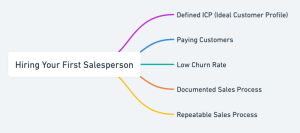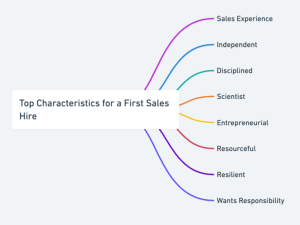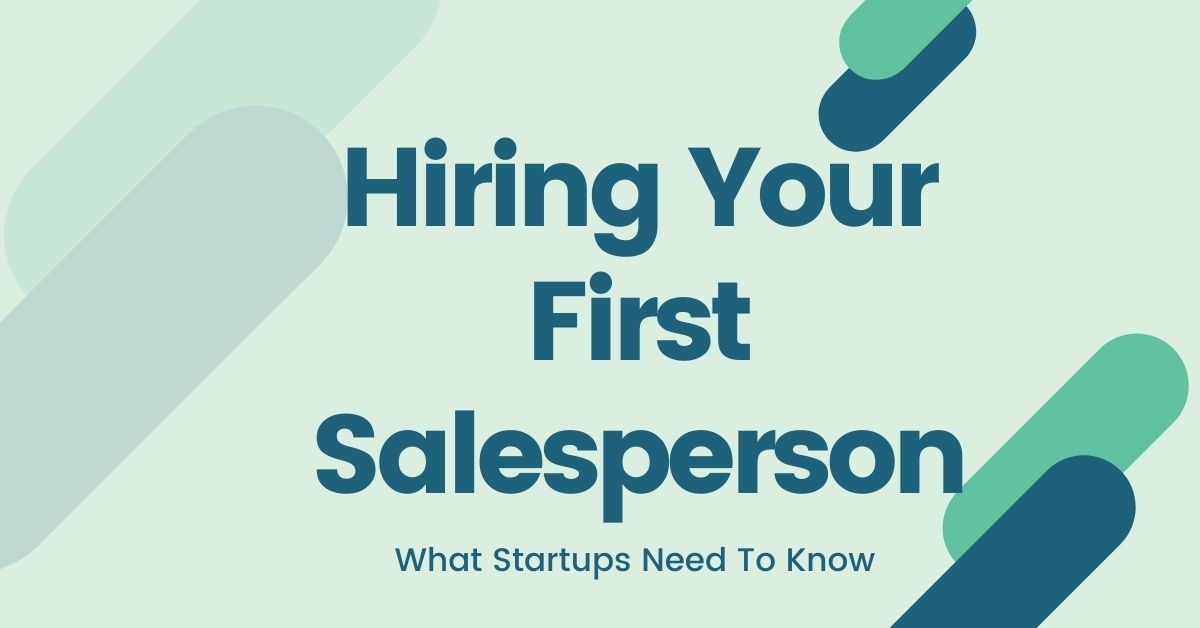Hiring your first salesperson for your startup is a major event. You’re hoping to employ someone who can help drive revenue which will validate your product, improve your runway, and give you a better chance of getting your next round of funding.
If you make the wrong hire, (did you neglect to use an experienced sales recruiter?) it can set you back not only financially, but also leave the rest of your team demoralized. They can begin to doubt the product and question if their effort is worth it. However, if you hire the right salesperson, you’ll energize the team, improve your confidence, and see revenue increase. As some say, sales cures all.
For a startup, any new sales talent hire is a major risk. The first sales hire is not like other hires or even other sales hires. It requires a different type of person, with a unique skill set, brought on at the right time.
For sake of clarity, first salesperson is defined as someone who runs a full sales cycle from lead to close.
Are You Actually Ready to Hire Your First Salesperson?
Technically the first salesperson is going to be one of the founders. However, most startup founders do not have a sales background and feel a seasoned sales person could do a better job. Many dread sales or want to give this responsibility to someone else. Unfortunately, rushing to hire your first non-founder salesperson is a great way to fail.
It’s a common sales mistake made by inexperienced founders because superficially, sales seems like a plug a play role. It’s not. Before making that first sales hire, founders need to have closed a few deals on their own at a minimum, ideally at least 5-20 (depending on type of sale) before they bring on their first full time salesperson (more details on timing below). Another way to think about it, do we have a repeatable process that can be documented?
Startup Founder To First Sales Rep
More importantly, the act of selling will teach a founder a ton about the market, their product, and their prospects. The fastest way for a founder to learn what needs to be built is to talk with potential customers. Founders will also understand how to position their product, more effective messaging, common objections, who is their ICP, content that should be created, feature requests/product holes, etc.
Consistent cold outreach, booking meetings, and customer calls will not only make their product better, but they’ll put their startup in a position to succeed when it’s time to hire their first salesperson.
If there isn’t a somewhat clear sales process and you haven’t defined your ICP, you’re risking getting ahead of yourself as a company. Bringing in an outsider to “take over sales” without knowing the basics is how you burn through money.
Founders want to focus on building their product. They don’t want to focus on doing cold outreach, doing intro calls, demos, and running a sales cycle. But this can lead to disaster. So before making your first sales hire, you need to make sure you’re ready. You can absolutely bring in a sales consultant who can help you as a founder improve your sale skills. Sales is a skill and a coach will quickly improve your sales ability. They’ll also ensure you’re not making 101 level mistakes.
Contact us if you need founder coaching or a sales consultant.
Factors For Startups To Consider When Hiring First Salesperson
Here are a list of factors you should be thinking about when deciding if the time is right to make that first sales hire.

- Ready: ICP Defined, paying customers (more required for SMB, less required for Enterprise), reasonable amount of churn, consistent sales process, cold outreach has led to customers, understanding of objections and how to overcome them.
- Do you know what your ideal customer profile is? If not, you’re going to send your salesperson down a lot of rabbit holes. They’ll waste time and burn cash. Check out this article on ICP in Sales for more info.
- Do you have paying customers? If you don’t, do not expect your first sales rep to get them. They might be able to but they probably wont do well. It’s going to be expensive and you’ll almost certainly miss out on all the benefits of talking to prospects from a founder’s perspective.
- How many paying customers do you have? There’s no exact number but it’s going to be related to your sales cycle length and deal size. If you sell to SMB and have short sales cycles (under a month), you probably want at least 15-20, if not more. Enterprise sales can take a long time so if you’ve closed a few, it may be time to consider hiring your first rep.
- What’s your churn? If you have a high rate of churn, there’s no point in bringing on a salesperson. Try to figure out what is causing the churn first and see if it’s solvable. If you can sign clients you’re doing something right and may be in a position to hire your first rep once you’ve plugged the leaky bucket. Otherwise you’re going to bring on clients and lose them. Not a recipe for success.
- Is there a consistent sales process? Are you able to predictably move from lead to close on a consistent basis and get clients? If so, you’re in a good position to hire that first rep. This is important because you will ramp your new hire more quickly, and reduce the risk of them having to figure it out. The process may evolve but they wont be going in blind. Document everything.
- How are you getting customers? Being able to acquire customers via cold outreach is stronger validation for your product and sales process than inbound leads. Inbound leads are great but they may not be something you can always rely on. If they dry up, you could be screwed. And you may not be able to effectively convert your ICP on a regular basis via marketing so being able to crack cold outreach is key. If you’ve worked your network or had friends sign up who make up most of your customers, that’s a sign you’re not ready to hire your first salesperson. Here are cold email tips to help you book more meetings.
Can You Afford to Hire Your First Salesperson?
Good salespeople, make good money. An accomplished enterprise account executive can expect a base salary in the $120-150K range plus commission/bonus. Total compensation could be in the $240-300K range. If they beat their number, it’s not unheard of salespeople making $400K-$750K at the enterprise level.
Mid-market salespeople can make a little below their enterprise counterparts but they’re still paid well. OTE can be in the $150-$250K range with similar base/commission splits as above. SMB reps make the least, and will top out usually around $150K OTE, with a $100-150K OTE range. OTE = On target earnings.
Those are ball park compensation ranges. This doesn’t not include any stock they may receive. It’s important to keep in mind that good talent costs money and these are the estimated rates you might be competing with if you’re considering a quality hire with options.
For an early stage startup, it’s tough to compete on salary and commission alone. It’s hard for you to beat what the Series D startup with $100 million in the bank is offering.
What Does A First Sales Hire Cost For A Startup?
To the point, a good first sales hire is going to cost at a minimum $75,000 in base salary a year. This is someone who has at least one year of closing experience, ideally two, and another year of SDR experience.
This would work for SMB and Mid-Market sales. If you have an enterprise product and can only sell large deals to enterprise clients with sales cycles in the 6-12 month range, it will be challenging and risky to hire someone under $100K base salary.
If they accept a base salary for under 100K and have enterprise sales experience, that would raise an eyebrow.
Remember, you have to include costs like CRM seats, sales tools like such as Apollo or one of these SalesLoft Competitors.
What To Look For In Your First Sales Hire

Some Sales Experience is Required When Hiring Your First Salesperson
Ideally your first sales rep has done this before. If they have experience at early stage startups as the first sales hire, with a verifiable and successful track record, they’re going to be an above average fit.
Most recruiters will tell you that it’s hard to find someone who has had success as the first sales hire and wants to do it again. That’s because it’s a hard job that’s usually not fairly compensated.
It’s a bit of a unicorn hire to find someone who has done well as the first sales rep and is open to being sales employee #1 for another startup.
Specific Sales Experience
It’s unlikely you’ll find someone who is going to do this again so look for someone who has at least two years of relevant sales experience in a closing role. That means they run the sales cycle, the title is usually “Account Executive.”
They also need another year of SDR work. SDRs book meetings and do cold outreach. This includes cold calling and cold emailing. Ideally as an Account Executive they are sourcing most or all of their opportunities themselves.
You need someone who considers themselves a hunter. Industry expertise is a nice to have, but not a requirement. Finding someone who has run similar types of sales cycles is going to reduce your risk.
Independent
Look for salespeople who are able to work independently. If they need to constantly rely on you for answers and require a lot of support, it’s not going to work out.
“The Lone Wolf” is a type of salesperson who flouts the company rules and does things on their own. This is a top performing salesperson persona but is not the best persona for building teams with because they don’t like structure.
This is good for early stage startups because you probably don’t have many rules for them to follow. They’ll figure it out.
Disciplined
Good salespeople are disciplined. Disciplined salespeople get work done. That’s important because sales is a numbers game. If you have to babysit them, you’re in trouble.
Scientist
Find someone who likes to experiment. Early on you have a good idea what is working but things change and you still want to run experiments to find out what works and what doesn’t. You want someone who will be creative because that can unlock new opportunities.
There are some salespeople who like to be dropped into a defined process and execute on it. These people make terrible early hires but good later stage hires once things are clearly established and you need to scale.
Entrepreneurial
If you can find your first sales hire who is entrepreneurial, this can not only be a way to sell them on your company but is also an indication that they take initiative to transform things from nothing to something.
Must Be Resourceful
Your first sales hire needs to be resourceful. Large companies have a ton of resources. They have tools, trainings, managers, etc. Early stage startups will have some tools and that’s about it. The first rep needs to be able to a lot with a little. And they need to be able to figure things out on their own.
This means if they’re not reading sales books and listening to podcasts that make them better, don’t hire them. Your first sales hire is going to be neglected by the company from a personal development standpoint. It’s normal. Startups can only do so much. But you need them to want to get better at their craft.
Resilient
Sales requires getting fed rejection all day long. Sales at an early stage startup can be an above average amount of rejection. You must screen for people who can eat rejection all day long and come back to work the next day hungry for more.
Wants A Lot Of Responsibility
First sales hires at startups are not only full cycle Account Executives, they’re also the SDR and their own sales manager. They are often responsible for account management, customer success, and customer service too.
Being responsible for creating selling materials such as a one pager and deck is another responsibility they’ll need to take on. Some people love the idea of this. Some people expect other departments to supply it.
It will vary by startup but there’s no doubt the first sales rep you hire will have a ton of responsibility. This is a selling point but you need to be careful not to take people who have tunnel vision or expect leads to be handed to them.
What To Avoid When Hiring First Salesperson
No Sales Experience = Don’t Hire
Do not make your first sale hire someone who has no sales experience unless you’re a founder with a lot of sales experience and you have time to develop them. Even then it’s likely a bad decision.
You can consider someone with no experience if you’re selling something to SMBs that requires a high level of activity and not much else.
Skip The Brands
Do not hire someone because they worked at well known established companies. They are selling on easy mode, working for a company that everybody knows. That’s a much easier job than what you’re asking them.
It’s not a hard no because they worked at Salesforce and American Express, but you shouldn’t overweight it. Usually Founders make the mistake of hiring from pedigreed companies but these people usually don’t work out.
Avoid Category Leaders
Salespeople who worked at companies that were clear category leaders are similar to people who worked at well known companies. Don’t overweight their success because they had it easy. They may be able to do the job but they must check off a lot of other boxes to be considered a first sales hire.
They were selling a product that people know, want, and is considered better than the competition. Your product is unknown in the category, likely lacking features, and requires selling to early adopters and innovators.
Too Senior
Salespeople who are too senior or have been at one company for too long should be avoided from consideration when hiring first salesperson. It will be hard to recruit them as a first hire from a compensation standpoint so you’re probably wasting your time.
More importantly, they’re likely out of touch with what is required to get the job done at an early stage startup. They’ve mastered their way of selling their product and can do it in their sleep.
It’s possible they have a top territory or have been coasting with a manager that likes them. If they’ve been at the same company for 5+ years, they have selling habits that wont easily transfer to a new startup.
Out of The Game
Salespeople who haven’t sold in awhile should be avoided when it comes to hiring first salesperson. A common mistake made by startup founders is to hire a former VP of Sales or Director to be the first sales hire. A founder promises them they’ll be responsible for the sales department in a few months and will be hiring some junior reps to manage soon.
What happens is the senior sales leader hasn’t been in the trenches in a long time and doesn’t have what it takes to get the job done. The pay cut is too much, they see the writing on the wall, and you’ve just wasted a lot of money and time. They often overpromise and underdeliver.
Never Trust The Rolodex
Don’t hire based on their rolodex. Rolodexes are worthless after a month. And they’re usually exaggerated. If you come across someone who claims to have a strong network that they’ll be able to quickly tap into.
Offer them a referral fee paid on signing any clients before you consider hiring them. For the most part, rolodexes are low value when it comes to hiring your first salesperson.
How To Hire A Salesperson For Your Startup
Hiring your first salesperson is a major hire milestone. Founders need to be careful not to get tricked by the pedigree, rolodex, and slick talking salesperson who has been killing their quota at a category leader.
They need to find a lone wolf type who can figure things out because they’re resourceful. When it comes to hiring the first salesperson, you need to make sure you’re ready as a startup.
It’s a hire you should not rush because you don’t like sales. Take your time to find the right person. The first salesperson as a startup is the Founder. Make sure you’ve built a repeatable process and can document what you’ve done to close deals.
If you’ve done this, not only will you be able to attract better talent, but when it comes to hiring the first salesperson, they’ll be more likely to succeed.
Additional Reading:
- SDR Outsourcing
- Hiring an Outsourced BDR
- Fractional SDR
- Hiring an SDR
- Sales Management Outsourcing
- Fractional Sales Management
- Sales Outsourcing
- SDR Outsourcing
- Fractional CRO
- Fractional VP of Sales
- B2B Sales Consulting
- Fractional COO
- Sales Coach
- How to Hire a Sales Manager
- Hiring your first SDR
- SDR Recruiting



